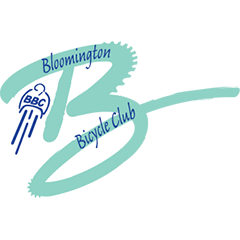Introduction. Recently we received the following article about what to do after a bicycle accident, especially when a car is involved. It was written by a representative of an organization that makes referrals of personal injury lawyers, not by a lawyer, and not by someone local to the Bloomington area. Nonetheless the article makes some important points and raises important issues. It behooves us all to think a little about what we might need to do in such a situation. You may differ about some of the points raised and you might wish to make additional points. If so, please submit a comment or even a full proposed blog post response!
================================
Many Americans choose to ride bicycles instead of drive cars every day. In addition to the benefits to your wallet, health, and the environment, there are also the dangers of driving on roads with much larger vehicles. Even the most careful of bicyclists can be injured in a crash.
Bicycle Laws in Indiana
The first step to keep yourself safe from crashes is to obey bicycle laws in Indiana. Here are a few rules every cyclist should be aware of to keep themselves safe.
- Bicycles must obey all motorist traffic laws.
- Hand signals must be used for turns when safe to do so.
- Between a half hour after sunset and a half hour before sunrise, bicycles must have a white light on the front, a red reflector and light on the back all visible from 500 feet.
- Bicycles can ride no more than two abreast on roadways.
- Bicycles must be equipped with a bell or other device to signal that is audible for at least 100 feet, but it can’t be a whistle or siren.
- Bicyclists must ride with two hands at all times when safe to do so. If carrying a package, the package can’t restrict them from holding both handlebars.
- Bicycles must be equipped with working breaks.
- Bicycles are only allowed to carry the number of passengers the bike was designed for. Extra passengers are not allowed in sidecars or otherwise not seated in a regular and permanent seat attached to the bike.
What to Do At the Scene of a Crash
First, be sure to call the police. They should file a report that includes all of the important details of the crash, which you may need later if you decide to file a claim with the driver’s insurance company. Be sure to give your statement of what happened to the police. All too often, bicyclists will be blamed for crashes.
Next, you should take down the contact and insurance information of the driver.
Look for any witnesses to the crash and point them out to the police, or take their contact information so that you may contact them later, as well. Be sure to take photographs at the scene and look for signs of hazardous road conditions or other helpful evidence that you may later need.
Try not to discuss fault with the police or the driver of the vehicle, as anything you say admitting responsibility may be used against you later during insurance settlements.
Above all, you should also make sure that you get medical treatment or visit the hospital, if necessary. Call 911 if you are unable to safely travel to a medical clinic or hospital. Some injuries are not apparent for hours or even days after a crash with a motorist.
Finally, do not repair or replace your bicycle immediately. Take photos of the damage that was done to your bike, helmet, or other gear. This will be vitally important if you want to be compensated for the value of the damaged items.
If you were injured in a bicycle accident, you may have had to miss work and lose out on wages, or pay for medical treatment. In this case, you will need to write a demand letter to the driver’s insurance company in which you seek damages for your claim. The demand letter should include a detailed account of the accident, your medical records and expenses, and any other relevant information. Insurance claims can be tricky, but so long as you have adequate evidence proving you were not to blame for the crash, you should be awarded the compensation you need to get healthy and back on the road.
*This article was not written by an attorney, and the accuracy of the content is not warranted or guaranteed. If you wish to receive legal advice about a specific problem, you should contact a licensed attorney in your area.
